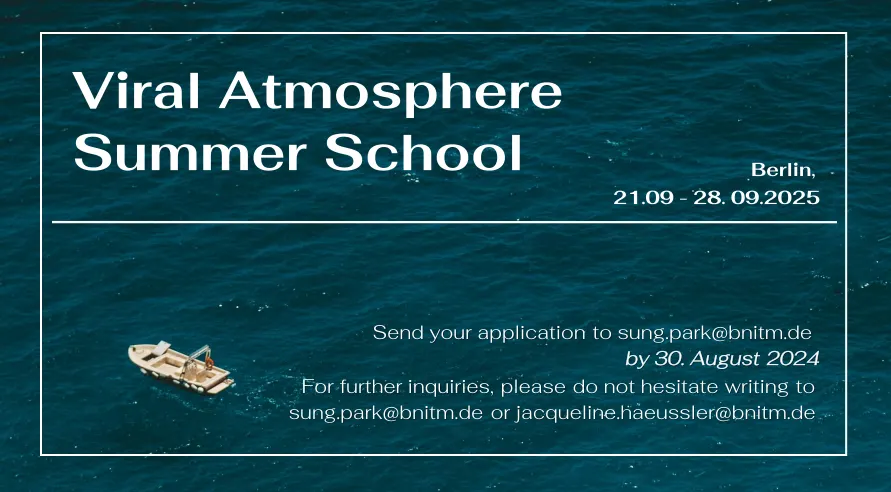“Viral Atmospheres: Maneuvering the affective geographies of pandemics and health”
Berlin, 21.9.-28.9.2025
Organizers
Sung Joon Park (BNITM Hamburg, Germany), Hansjörg Dilger (FU Berlin, Germany), Julia Hornberger (Wits University, Johannesburg, South Africa), Bo Kyeong Seo (Yonsei University, Seoul, Korea), Nene Morisho (Pole Institute, Goma, DRC), Jacqueline Häußler (BNITM Hamburg, Germany)
Keynote speakers
Frédéric Keck (LAS Paris, France)
Tania Rossetto (Università di Padova, Italy)
Arne Vogelgesang (Artist, Berlin, Germany)
Viral Atmosphere Summer School
Viral Atmosphere is a transdisciplinary summer school on the felt spaces of the Covid-19 pandemic. The concept of the atmosphere draws our attention to the ways feelings can be understood to ‘surround us,’ to be ‘poured into space,’ ‘occupy spaces’ and are influenced by space, as recent works in neophenomenology have been characterizing this concept*. That is,an atmosphere is essentially a description of the felt space—a Gefühlsraum.
In our summer school, we suggest that felt spaces help us to enrich our understanding of the impact of the pandemic and the global health response to it. For instance, an isolation room may be a three-dimensional space. Exploring it as a felt space filled with feelings of anxieties, exhaustion, or ease helps us to get a grasp at the embodied experience of immobilization during the pandemic. Public spaces can be similarly conceived as felt spaces of exposure that radiate feelings of mistrust, vulnerability, and fear. Or, exploring the digital world of social media and the internet as a felt space may proffer new questions for understanding how information and also misinformation affects people.
The practical, collaborative, and transdisciplinary engagement of the felt spaces of the pandemic in our summer school attempts to move beyond the ‘methodological nationalism’ in science and politics of pandemic preparedness and response**. In spite of repeated calls for holistic One World approaches to health, research and action remain chiefly centered on the nation-state and are perhaps more than ever defined by countries of the global North. By contrast, we will explore how felt spaces allow us to trace the affective geographies of pandemics and global health. What practices of visualizing and comparing atmospheres, including artistic modes of expression, can get the affective geographies to gel? How have people in different places been experiencing and maneuvering these geographies and keep on maneuvering them as they search for a mode of remembering the pandemic? Finally, we want to ask what can be learned from these affective geographies of pandemics for future global public health emergencies.
Viral Atmospheres has the following aims:
•
Explore methods and tools to study feelings in epidemics, pandemics, and other public health emergencies as atmospheres
•
Document and reconstruct the felt spaces of pandemics through the integration of different disciplines and their approaches
•
Map the affective geographies of the pandemic through transdisciplinary collaboration
The summer school invites students at advanced MA level and PhD level from a broad range of disciplines, such as social and cultural anthropology, area studies, geography, media studies, visual and performing arts, as well as life sciences to participate in a transdisciplinary and collaborative summer school. In particular, we invite students, who work on:
•
Covid-19 pandemic, epidemics and more generally public health crises
•
Feelings, atmospheres, and affect
•
Spaces, mobility, and geography
And who want to
•
Showcase their ongoing work in transdisciplinary working groups
•
Make a contribution to transdisciplinary and collaborative output (special issue, online
exhibition, book publication).
The summer school will provide lectures, seminars, and experiments by partners and researchers of the VW-funded research project “Mobility Regimes of Preparedness and Response: The Case of Covid-19” by researchers in Germany, South Korea, South Africa, and the Democratic Republic of the Congo (https://www.moreppar.com). The researchers of this project will showcase works that extend the comparative analysis of country-specific experiences of the pandemic toward a collaborative study of the affective geography of the felt spaces of the pandemic. Furthermore, the summer school will comprise practical exercises in transdisciplinary collaborative research and publication on affective geographies.
Organization and application
The cost of travel and accommodation will be covered by the MoRePPaR project. Please send us your application (in English) comprising:
•
Motivation letter
•
CV or in case you apply as a student of the arts a CV and portfolio
•
Abstract of maximal 500 words summarizing the material you want to present (stories from the field, data, video material, sound material, visual material, ...) and how you want to present it (presentation of paper or artwork, performance, reading, ...)
For further inquiries, please do not hesitate writing to sung.park@bnitm.de or jacqueline.haeussler@bnitm.de.
*Schmitz, Hermann. 2014. Atmosphären. Freiburg / München: Verlag Karl Alber. Schmitz, Hermann, Rudolf Owen Müllan, and Jan Slaby. 2011. “Emotions Outside the Box—the New Phenomenology of Feeling and Corporeality.” Phenomenology and the Cognitive Sciences 10 (2): 241–59. Böhme, Gernot. 2017. Atmospheric Architectures. Bloomsbury Publishing. Böhme, Gernot, and Jean-Paul Thibaud. 2016. The Aesthetics of Atmospheres. Routledge. Eisenlohr, Patrick. 2018. “Suggestions of Movement: Voice and Sonic Atmospheres in Mauritian Muslim Devotional Practices.” Cult. Anthropol. 33 (1): 32–57. Schroer, Sara Asu, and Susanne B. Schmitt, eds. 2017. Exploring Atmospheres Ethnographically. Oxon: Routldge.
**Wimmer, Andreas, and Nina Glick Schiller. 2002. “Methodological Nationalism and Beyond: Nation-State Building, Migration and the Social Sciences.” Global Networks 2 (4): 301–34.
